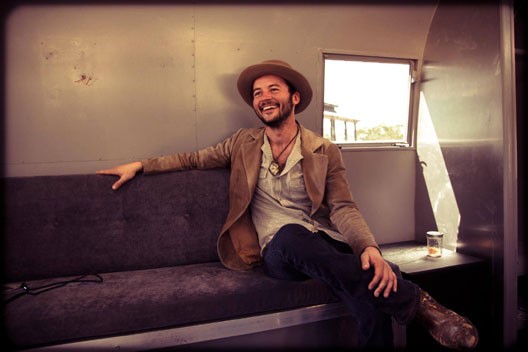

|
Jonny Burke is one H shy of sharing a name with the lyricist behind “Pennies from Heaven,” “Misty” and other Great American Songbook entries. But when it comes to what might someday be called the Great Americana Songbook, he won’t have to worry about ID mix-ups. Burke’s work is as distinctive as the landscape of the Texas Hill Country where he was raised.
It would be a mistake, however, to assume the geography of his upbringing automatically puts his music into college-country/red-dirt territory. His latest album, Along Alone Alright, on his own Dream Car Records label, stakes out turf in a wide-open space where artists freely mix folk and blues with a pinch of country twang, a dose of rock swagger and a whole lot of heart.
Burke’s been stirring those elements together since he and a childhood pal started the Dedringers when they were 15. Quickly making a name for themselves, they wound up spending seven years studying the human condition in the anthropology-lab bars of Texas, and well beyond.
After their amiable 2009 split, Burke moved to a friend’s guesthouse in Topanga Canyon, California. He stayed three years, exploring the L.A. music scene in-between tours with artists like James McMurtry and Ryan Bingham. The weather and surf were powerful attractions, but like most Texans, he was finally lured back—though he managed to perform in all 48 contiguous states before he turned 30.
In 2016, he headed to Durham, North Carolina, to record Along Alone Alright, his third full-length album, with American Aquarium’s Ryan Johnson and Whit Wright, who co-produced.
Its 10 songs deliver food for thought about some weighty topics, such as aging, mortality and loss—including the death of dreams. With only three decades on the planet, it might seem early for Burke to delve into such subjects—despite his advanced field studies. But his applied learning actually started in his single-digit years, when he started to discover poets and pickers whose songs weren't on most kids' mixtapes.
“Chuck Berry’s songs spoke to me as a child and raised my consciousness to a greater level. As did Hank Williams’ songs. And John Prine’s,” Burke says. “I realized at a very young age that songs are a great medium for a story.”
He set his sights on writing his own, and has proven remarkably good at it. In the standout tune “World's On Fire,” Burke guides the youthful hopes of a daydream boy and a calico girl toward a place where “Jack and Diane” meet “The River.” Over his gorgeous acoustic strumming, he sings, I fell asleep to the TV/I don't see much reality/Rich girls talkin' all 'bout themselves/You work at Walmart stocking shelves/Ain't got two dimes to rub together/We used to say this ain't forever.
“I got to know the couple in the song,” Burke says. “I felt like I had birthed these two characters. I love ‘em. They're from my generation and they belong to a group that doesn't get an honest portrayal in mainstream America. They know they face a hopeless future, but have not lost their ability to love.”
Another acoustic ballad, “Funerals and Weddings,” addresses “heartbreak and loss and what a grim state of affairs we live and die in.” Among its devastatingly piercing lyrics is this couplet: At the end of the day you're either winning or you're settling/Everybody dresses up at funerals and weddings.
“The state I was in at the time—drunk and heartbroken—helped me to remain sincere about what I was trying to convey,” Burke explains. “Sincerity,” he adds, “goes a long way in the book of song.”
Yes it does. But what sets Burke apart as a songwriter—and performer—is that combination of empathy and admiration for his characters. He doesn’t just observe their lives; he steps inside them—and looks beyond their conflicts to find connections.
“I love songs that tell a story that transcends right and wrong, black and white, heaven and hell,” he says. “By creating these pairs of opposites in our everyday lives, we limit how much of what’s going on around us really engages our senses.”
But even though he takes his craft seriously, Burke also knows the value of levity, as on the Stonesy country-blues picker “Sweeter Than You.”
“I wanted to write a real country song with the concept that everything sucks except for my sweetheart,” he says. “‘What's wrong in the world?’ ‘Everything.’ ‘Who do you love?’ ‘You, baby.’ It's like a cynic’s love song. Or a realist’s love song, depending on your view.”
With “Rent’s Gettin’ Bigger,” he recalls the days when he and his friends taught themselves to play by mimicking their favorite artists, then formed bands together.
“I wrote this about the guys I grew up playing with,” Burke says. “It's a bit nostalgic in a ‘rock ‘n’ roll will never die’ way, and was fun to write because it naturally lent itself to dropping in subtle references to the MC5 and the Velvet Underground and Neil Young. It gives me comfort to think that right now, there's some kids in a band somewhere covering ‘Tonight’s the Night’ and hoping they'll get laid. That was us.”
On another standout, “Where’d the Time All Go,” he sounds as if he graduated with honors from the Todd Snider School of Wry Self-Deprecation, where he also might have learned a thing or two about spinning truths into yarns—and vice versa. This song finds him going from a compromising situation with a politician’s daughter to getting lost—and found—in city streets and country towns.
“As a singer of folk songs, it's gonna be a rough four years if every time some politician does some dumbass shit I have to sing about it,” Burke says, laughing. “I'd rather sing about partying with their hot daughters.” But the song also touches on “growing up and suddenly realizing you're not the youngest boxer in the ring anymore.”
Of the gentle closer “Old Time Feeling (Like Before),” written with Evan Felker and R.C. Edwards of the Turnpike Troubadours, Burke says, “The three of us write about drunken songwriters and failed relationships a lot. That being said, we try our best to keep those songs from being bad clichés.”
No worries there. It’s a beautiful end to an album filled with charm—and one other potent element: Burke’s enduring belief in the life-transforming power of a single song. Even if that transformation ends when the song does, it can happen again—each time someone listens, or flips through a someday songbook and reads a few lyrics. Maybe they’ll look to see who wrote them, and notice a name hanging in the corner. Without an H.
– Lynne Margolis
| Date | Venue | City | State | Note |
|---|---|---|---|---|
| No Tour Dates Available | ||||